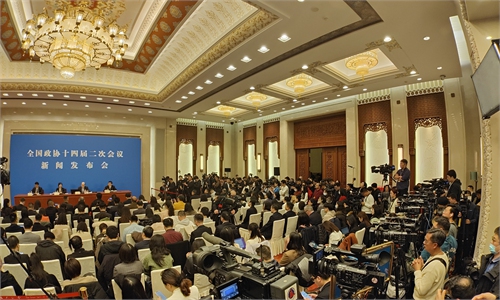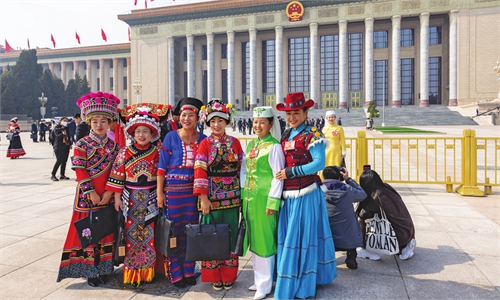TWO SESSIONS 2024 / OPINION
Chinese development a remarkable mixture of local and international experience

The scenery of the countryside in Yiyang city, Central China's Hunan Province. Photo: VCG
Editor's Note:
China's annual two sessions began this week. This critical series of meetings in spring is vital to defining China's approach to economic, political and foreign policy issues for the whole year. It also offers observers a window into the latest ideas and practices of China's development in various aspects, including the whole-process people's democracy, high-quality development, Chinese modernization and the wisdom the country provides to global governance.
In the second piece of the series "Two sessions inspirations," Kerry Brown (Brown), professor of Chinese Studies and director of the Lau China Institute at King's College, London, told Global Times (GT) reporter Su Yaxuan that China's intellectual and cultural heritage is remarkable, and the West needs to understand and learn from China. "The Western tradition should be able to deal with China's difference rather than seeking to try to change it to become more like itself," Brown said.
GT: The two sessions began this week, and Chinese modernization is an important topic of discussion. You depict China as a "surprising" country and acknowledge that China is seeking its own path. How do you understand Chinese modernization? Compared with the Western path of modernization, what are the characteristics of China's approach?
Brown: China's path to modernization in the last half a century has had the advantage of being able to observe what other countries, including the US, European countries and Japan, did earlier in their programs to change their economies and develop. What China did over this period is, as the phrase in the late 1970s put it, emancipating the mind, seeking truth from facts and keeping pace with the times. It adopted a pragmatic approach and one that allowed many different ideas about how to develop itself to be tried and tested, for example, township and village enterprises. These were tried in some places and then when they showed potential, were promoted in others, to the point that they became national policy. So China was very open-minded about what models it took from the outside world, but it also made sure these were adapted to the unique situation within the country. This was mostly about acknowledging the scale and diversity of China, a country that is continental in size and complexity. I think this made the Chinese experience very different than anywhere else. It was a remarkable mixture of the local and the international.
GT: As a scholar who has lived in China, you describe the changes in China over the past 40 years as "earth-shattering." What do you think has contributed to China's progress over the past 40 years? What impact can this progress have on the rest of the world?
Brown: Of course, the main change has been in people's material living standards. At the start of 1978, per capita GDP was about $190. Today it is coming close to about $12,000. That means immense changes in people's general living standards. Over the last 40 years, more people than ever before have seen their living standards generally increase in China. The changes show themselves in the infrastructure the country has, and the remarkable transformation of its population from a largely rural living one to one where more than half are now living in cities. Broadly, this has been achieved by flexible policy-making and in the early decades by the government allowing space for innovation and Improvisation. It has also been nurtured by a huge desire among the Chinese people themselves to see their living situation change and improve.
GT: You have been observing, researching and writing articles about China. From your perspective, what are the differences between China and the West? How do their differences affect global peace and prosperity? Why do you believe the West should stop trying to transform China?
Brown: I think the main issue is that we need to acknowledge (because it is a fact) that there is a written Chinese corpus of material reaching back over 3,000 years, and that tradition, which has continued until today, can find perhaps the world's richest, longest lasting and most diverse worldviews and traditions of thinking. Of course, there is rich literature in the West, and very distinctive views and philosophies. But China is rich too, and it is important for the West to become as familiar now with the works of Mencius, Confucius and Zhuangzi, as the Chinese are with Plato, Socrates and Aristotle. Chinese and Western/European cultures are two important expressions of humanity, along of course with traditions of thinking elsewhere, in India, Africa and Latin America. But the sheer longevity and completeness of China's intellectual and cultural heritage is remarkable, and must have relevance to the way the country is seen today, and how it relates to itself and the outside world.
GT: Why do you believe that allowing China to "be itself" is the best option for the West and the world?
Brown: China has a unique identity - like everywhere else. The West (namely North America and Europe) believe in the importance of pluralism. While China has taken many ideas in the last decades from the outside world to develop itself and its economy, it has also remained at its core culturally very distinctive. This means that successful engagement with China means acknowledging its differences, but being respectful of that. It also means embracing a China which often is coming from a different background and thinking in a slightly different way. The Western tradition should be able to deal with China's differences, rather than seeking to try to change it to become more like itself. That has never, and will never work. Of course, both influence and impact each other. But this needs to be a positive and consensual process, not a coercive one. Otherwise, it won't work and will lead to negative outcomes.
GT: You have previously mentioned that the emergence of a wealthier and more prosperous China would pose a serious "problem" because the West lacks confidence in its own system. Why is the West becoming increasingly unconfident in its own system?
Brown: Western governance systems have largely proved durable and have delivered important freedoms, both economically and intellectually, to their citizens. But in a decade, waves of populism, dissatisfaction with the outcomes of globalization, and a general sense of confusion and division in many Western societies have created disillusionment. We can only hope that this is a temporary phase and we will emerge into better times. But even as we do, we need to be more humble about ourselves and more accepting of others. The emergence of China and other developing countries is a hugely significant moment and marks a radical change from much of the recent past. New powers are coming to the forefront, and they will shape the future, with the West, rather than against or in spite of it. In the end, too, everyone is facing the challenges of AI and global warming. Together, we need to focus on these as much as we can, rather than engage in fights with each other over perceived differences which, in the end, however important they seem, are not the most pressing issues facing humanity at the moment.
GT: How do you view the current China-UK relationship?
Brown: Currently, the UK and China are in flux. The UK is likely to see a new government elected this year. There is a desperate need for a reset to UK-China relations after several years of misalignment and tensions. At heart, the UK and China have a long and rich relationship. The large number of Chinese students now in Britain is a tangible and important sign of our relationship. It is important that more people in Britain engage with China, and become as knowledgeable as they can about China. This is crucial in order for us to have the best relationship possible.
GT: How should the UK develop its relationship with China? In which areas do you think China can bring opportunities for the UK's development?
Brown: The UK needs to renew its infrastructure. It also needs to combat global warming. In both these areas, China is a natural partner. These are the ones where we will see the most scope for cooperation.


